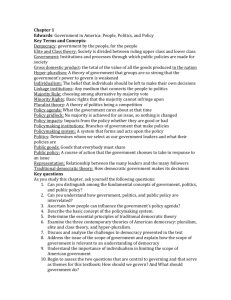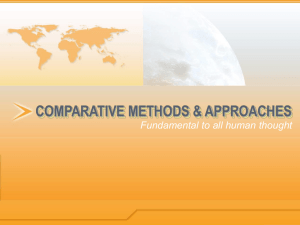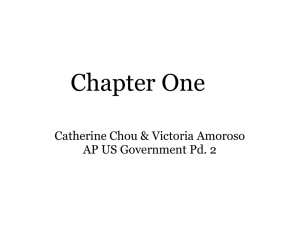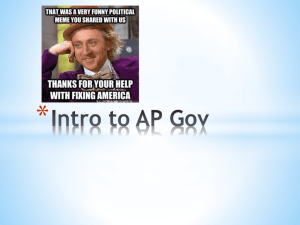Chapter 1 Note
advertisement
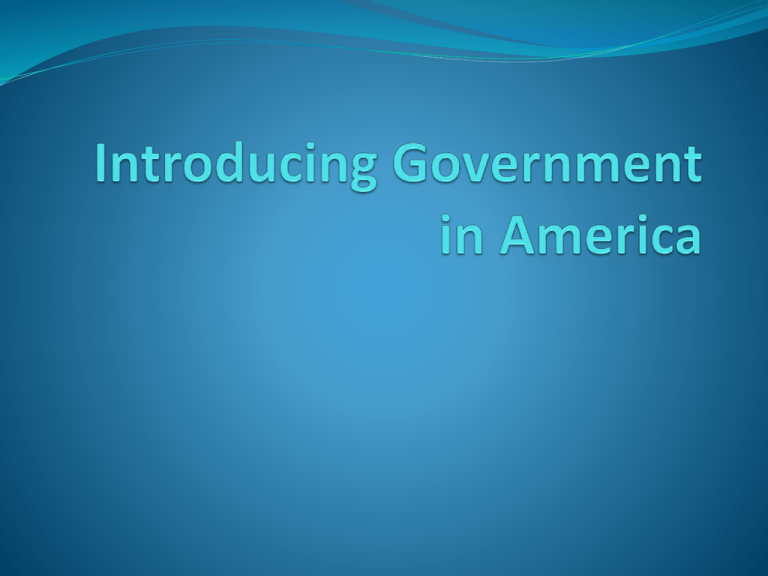
Politics and Government Matter List of ways government has affected your life: Public Schools Drivers license and driving Age you can drink, smoke, vote Social Security and your job Politics and Government Matter Why do young people not care about politics and government? Do you feel like you can make a difference? Why don’t young people vote? Politics and Government Matter Politics and Government Matter Presidential Election Turnout Rates by Age Politics and Government Matter Why should you stay informed about public affairs? 1. Fosters civic virtues such as political tolerance. 2. Helps citizens to identify which policies would benefit them and incorporate them in their voting behavior. 3. Promotes active participation in politics. Politics and Government Matter Why does voter turnout matter? Those who participate in the political process are more likely to benefit from government policies and programs. Media in politics today. Presidential speeches. Government The institutions that make authoritative decisions for any given society are collectively known as government. In our own national government these consist of Congress, the president, the courts, and federal administrative agencies. Roughly 500,000 elected officials in the United States. Government Two fundamental questions about governing: 1. How Should We Govern? 2. What Should Government Do? Maintain a national defense Provide public services Preserve order Socialize the young Collect taxes Politics Politics determines whom we select as our government leaders and what policies these leaders pursue. The Lasswell Model: -“Who gets what, when, and how.” Politics “WHO”……….. At a minimum this includes voters, candidates, groups, and parties. Politics “WHAT”……… Refers to the substance of politics and government benefits such as medical care for elderly, and burdens such as taxes. Politics “HOW”……… How people participate in politics. Through voting, supporting, lobbying. Politics The way in which people get involved in politics make up their political participation. Voting Run for office America has one of the lowest rates of voter participation in the world. Low voter turnout has an effect on who holds political power. Politics Single-issue groups: groups so concerned with one issue that members cast their vote on the basis of that issue only, ignoring a politician’s stand on everything else. Example: Abortion The Policy Making System The Policy Making System What do people do to express their opinions in a democracy? Vote Join political party Form interest groups In this way, people’s concerns enter the linkage institutions. The Policy Making System Linkage Institutions: the political channels through which people’s concerns become political issues on the policy agenda. Parties and interest groups strive to ensure their members concerns receive appropriate political attention. Elections provide citizens with a chance to make their opinions heard. The Policy Making System All these institutions help to shape the government’s policy agenda, the issues that attract serious attention of public officials and other people actively involved in politics. If a politician wants to get elected, they must pay attention to the problems that concern voters. Political issues: an issue that arises when people disagree about a problem and how to fix it. The Policy Making System Policymaking Institutions: Congress Presidency The Courts Bureaucracies Very few policies are made by a single policymaking institution. The Policy Making System Public Policy: Every decision the government makes, budget it establishes, and ruling it hands down. Many different types of policies: Congressional Statute Presidential Action Court Decision Regulation The Policy Making System Public Policy: Some issues remain low priority until they gain media attention. Example: AIDS Magic Johnson The Policy Making System Once policies are made and implemented, they affect people. Policy impacts are the effects that a policy has on society’s problems. Translating people’s desires into effective public policy is crucial to the workings of democracy. The Policy Making System Democracy Democracy: a system of selecting policymakers and of organizing government so that policy represents and responds to the public’s preferences. Traditional democratic theory rests on a number of key principles that specify how government decisions are made in a democracy. Traditional Democratic Theory Key Principles: Equality in voting Effective participation Enlightened understanding Citizen control of the agenda Inclusion Traditional Democratic Theory Key Vocabulary: Majority rule: the will of over half the voters will be followed. Minority rights: Basic principles such as freedom of speech and assembly. The majority cannot infringe on these rights. Representation: Describes the relationship between the few leaders and many followers. Contemporary Theories of American Democracy Pluralist Theory: states that groups with shared interests influence public policy by pressing their concerns through organized efforts. Example: NRA, NOW, UAW Contemporary Theories of American Democracy Elite and Class Theory: states that upper-class elite pulls the strings of government. Tax cuts for wealthy, helping big business. Contemporary Theories of American Democracy Hyperpluralism: states that many groups, not just the elite ones, are so strong that government is unable to act. Government is a servant to these groups. Challenges to Democracy -Increased Technical Expertise -Limited Participation in Government -Escalating Campaign Costs Diverse Political Interests American Political Culture Political Culture: an overall set of values widely shared within a society. Examples: Liberty Egalitarianism Individualism Laissez-faire Populism Challenges to Democracy Increased Technical Expertise Limited Participation in Government Escalating Campaign Costs Diverse Political Interests (policy gridlock) Democratic Theories Criteria of traditional democratic theory as formulated by Robert Dahl consists of : Citizenship must be open to all within a nation. Those who participate in political organizations must be representative of the general population. freedom of speech and press One person gets one vote. Democratic Theories B. Berelson in “Democratic Practice and Democratic theory” concluded that an effective democratic system requires some citizens to be apathetic, while others to be interested and active. Democratic Theories According to E.E. Schattschneider, politics can also be defined as conflict expansion.


